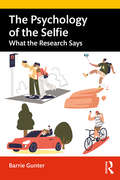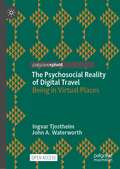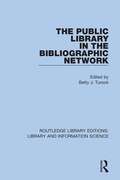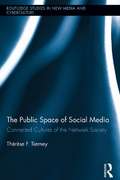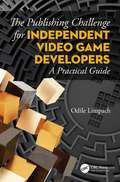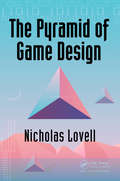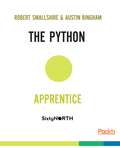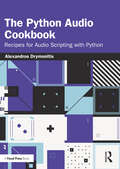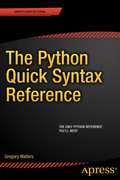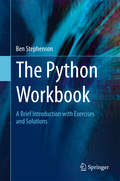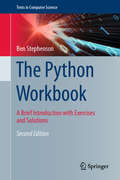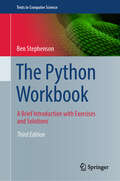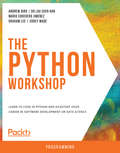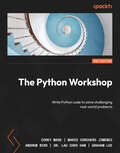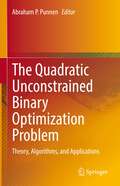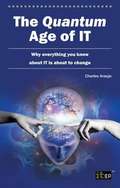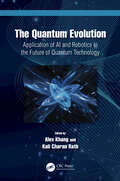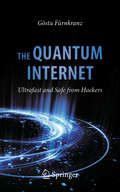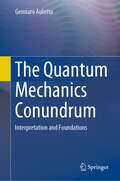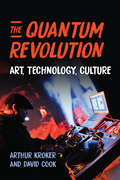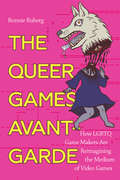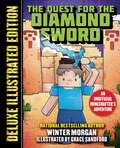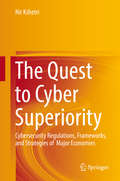- Table View
- List View
The Psychology of the Internet
by Patricia WallaceThis timely volume explores the psychological aspects of cyberspace, a virtual world in which people from around the globe are acting and interacting in many new, unusual, and occasionally alarming ways. Drawing on research in the social sciences, communications, business, and other fields, Patricia Wallace examines how the online environment can influence the way we behave, sometimes for the better, sometimes not. Our own online behavior then becomes part of the Internet's psychological environment for others, creating opportunities for shaping the way this new territory for human interaction is unfolding. Since the Internet--and our experience within it--is still young, we have a rare window of opportunity to influence the course of its development. With a new preface that incorporates many of the changes online and in the field since the hardcover edition was published, the paperback edition of The Psychology of the Internet includes the latest coverage of e-commerce, workplace surveillance and datamining, all areas of recent intense public concern. Patricia M. Wallace is Executive Director of the Center for Knowledge and Information Management at the Robert H. Smith School of Business, University of Maryland. She is author of an interactive psychology CD-ROM called PRISM and of the textbook Introduction to Psychology, Fourth Edition (with Jeffrey Goldstein). Dr. Wallace is also the principal investigator on grants from the Annenberg Projects/Corporation for Public Broadcasting dealing with language learning through CD-ROMs and the Internet.
The Psychology of the Selfie: What the Research Says
by Barrie GunterThe Psychology of the Selfie provides a comprehensive overview and analysis of research on the significance of selfies, offering insights into the topic from a psychological perspective and examining important issues such as body image, self-objectification, mental health and psychological benefits. Selfies are a worldwide phenomenon. Although dismissed by critics as a sign of self-absorbed narcissism, they are also a social currency that maintains and reinforces friendships, a feedback loop for self-identity affirmation, a promotional tool for gaining social influence, and a method for preserving memories of life events. In this book, Barrie Gunter expertly explores the psychological underpinnings of the contemporary global phenomenon of "selfies", from the historical roots and meteoric rise due to technical advancements, to the different personality types of selfie-takers, to social relationships, to group and personal identity. Looking at both the psychological nature and impact of selfies, this book reviews different psychological outcomes for selfie-takers, both positive and negative, and the growth in psychological and physical problems that can sometimes arise. Presenting a comprehensive analysis specifically of selfie behaviour, this book is an essential reference for students and researchers in communications and media, journalism, information studies, psychology and sociology, as well as anyone with a general interest in the phenomenon.
The Psychosocial Reality of Digital Travel: Being in Virtual Places
by Ingvar Tjostheim John A. WaterworthThis open access book takes a fresh look at the nature of the digital travel experience, at a time when more and more people are engaged in online social interaction, games, and other virtual experiences essentially involving online visits to other places. It examines whether these experiences can seem real to the virtual traveller and, if so, under what conditions and on what grounds. The book unpacks philosophical theories relevant to the feeling of being somewhere, emphasising the importance of perception and being-in-the-world. Notions of place are outlined, based on work in tourism studies, human geography, and other applied social fields, with an aim to investigate how and when different experiences of place arise for the traveller and how these relate to telepresence – the sense of being there in another place through digital media. Findings from recent empirical studies of digital travel are presented, including a survey from which the characteristics of “digital travellers” are identified. A review of selected interactive design trends and possibilities leads to the conclusion, which draws these strands together and looks to the future of this topical and expanding field.
The Public Library in the Bibliographic Network (Routledge Library Editions: Library and Information Science #69)
by Betty TurockThis book, first published in 1986, focuses on valuable information to all public library professionals who have questions about their participation in bibliographic networks. Contributors provide insights into both the benefits and the costs of networking by libraries of varying sizes and geographic locations. The actual uses of networks, their costs (including initial and ongoing expenses), and staffing needs are clearly explained.
The Public Space of Social Media: Connected Cultures of the Network Society (Routledge Studies in New Media and Cyberculture)
by Therese TierneySocial media is restructuring urban practices–through ad-hoc experimentation, commercial software development, and communities of participation. This book is the first to consider how practices contained within social media are situated within a larger genealogy of public space, including theories of communal identity, civitas and democracy, the fete, and self-expression. Through empirical research, the actual social practices of participants of networked publics are described and analyzed. Documenting how online counterpublics use the Internet to transmit classified photos, mobilize activists, and challenge the status quo, Tierney argues that online activities do not stop in online conversations; they are physically grounded through mobile GPS coordinates which are then transformed into activities in physical space—the street, the plaza, the places where people have traditionally gathered to demonstrate and express their opinions publicly.
The Publishing Challenge for Independent Video game Developers: A Practical Guide
by Odile LimpachProfessor Odile Limpach gives independent developers everything they need to succeed in the world of video game publishing. The Publishing Challenge for Independent Video Game Developers: A Practical Guide defines what game publishing means for the indie developer and offers a concise framework to tackle the decision of whether to self-publish or not. Furthermore, the text establishes a catalogue of current known publishers with some salient characteristics and offers a list of useful publishing tools. Along with showcasing testimonials from several young and seasoned developers on their experiences with publishing and partners and recommendations from renown experts of the industry, this book offers tools, platforms, and guides to game publishing. Key features: Provides a broad overview of the game publishing market Explores criteria for choosing between a publishing partner or self-publishing Offers case studies and testimonials from indie game developers and publishers about the process. Professor Odile Limpach teaches economics and entrepreneurship at the Cologne Game Lab, TH Köln (Technical University of Cologne). She is also co-founder of the Acceleration Program SpielFabrique 360° and works as a Strategic Consultant for games and serious game projects. Between 2007 and 2014, she was the managing director of the German entertainment software studio Ubisoft Blue Byte. Before, she was the managing director of Ubisoft GmbH. She graduated from business school Institut Commercial de Nancy in France and completed her MBA in the United States. Odile Limpach is also involved as a volunteer in the areas of vocational training and acts as a German partner for Games for Change Europe. Furthermore, she acts as an advisor (Conseiller du Commerce Extérieur) for the French Ministry for International Business Development.
The Pyramid of Game Design: Designing, Producing and Launching Service Games
by Nicholas LovellGame design is changing. The emergence of service games on PC, mobile and console has created new expectations amongst consumers and requires new techniques from game makers. <P><P>In The Pyramid of Game Design, Nicholas Lovell identifies and explains the frameworks and techniques you need to deliver fun, profitable games. Using examples of games ranging from modern free-to-play titles to the earliest arcade games, via PC strategy and traditional boxed titles, Lovell shows how game development has evolved, and provides game makers with the tools to evolve with it. <P><P>Lovell shows how service games require all the skills of product game development, and more. He provides a toolset for game makers of all varieties to create fun, profitable games. Filled with practical advice, memorable anecdotes and a wealth of game knowledge, the Pyramid of Game Design is a must-read for all game developers. <P><P>Key Features <li>Harness the Base, Retention and Superfan Layers to create a powerful Core Loop. <li>Design the player Session to keep players playing while being respectful of their time. <li>Accept that there are few fixed rules: just trade-offs with consequences. <li>Adopt Agile and Lean techniques to "learn what you need you learn" quickly. <li>Use analytics, paired with design skills and player feedback, to improve the fun, engagement and profitability of your games. <li>Adapt your marketing techniques to the reality of the service game era. <li>Consider the ethics of game design in a rapidly changing world.
The Python Apprentice
by Austin Bingham Robert SmallshireLearn the Python skills and culture you need to become a productive member of any Python project. About This Book • Taking a practical approach to studying Python • A clear appreciation of the sequence-oriented parts of Python • Emphasis on the way in which Python code is structured • Learn how to produce bug-free code by using testing tools Who This Book Is For The Python Apprentice is for anyone who wants to start building, creating and contributing towards a Python project. No previous knowledge of Python is required, although at least some familiarity with programming in another language is helpful. What You Will Learn • Learn the language of Python itself • Get a start on the Python standard library • Learn how to integrate 3rd party libraries • Develop libraries on your own • Become familiar with the basics of Python testing In Detail Experienced programmers want to know how to enhance their craft and we want to help them start as apprentices with Python. We know that before mastering Python you need to learn the culture and the tools to become a productive member of any Python project. Our goal with this book is to give you a practical and thorough introduction to Python programming, providing you with the insight and technical craftsmanship you need to be a productive member of any Python project. Python is a big language, and it's not our intention with this book to cover everything there is to know. We just want to make sure that you, as the developer, know the tools, basic idioms and of course the ins and outs of the language, the standard library and other modules to be able to jump into most projects. Style and approach We introduce topics gently and then revisit them on multiple occasions to add the depth required to support your progression as a Python developer. We've worked hard to structure the syllabus to avoid forward references. On only a few occasions do we require you to accept techniques on trust, before explaining them later; where we do, it's to deliberately establish good habits.
The Python Audio Cookbook: Recipes for Audio Scripting with Python
by Alexandros DrymonitisThe Python Audio Cookbook offers an introduction to Python for sound and multimedia applications, with chapters that cover writing your first Python programs, controlling Pyo with physical computing, and writing your own GUI, among many other topics. Guiding the reader through a variety of audio synthesis techniques, the book empowers readers to combine their projects with popular platforms, from the Arduino to Twitter, and state-of-the-art practices such as AI. The Python Audio Cookbook balances accessible explanations for theoretical concepts, including Python syntax, audio processing and machine learning, with practical applications. This book is an essential introductory guide to Python for sound and multimedia practitioners, as well as programmers interested in audio applications.
The Python Quick Syntax Reference
by Gregory WaltersThe Python Quick Syntax Reference is the "go to" book that contains an easy to read and useguide to Python programming and development. This condensed code and syntaxreference presents the Python language in a well-organized format designed tobe used time and again. You won't find jargon, bloated samples, case studies, or history of Hello Worldand computer theory in this handy reference. This Python syntax reference ispacked with useful information and is a must-have for any Python developer. What you'll learn Variables, strings, lists, dictionaries andconditional statements are and how to use them Some of the standard libraries and what they cando to help you How to write your own functions How to write your first Python program based onterminal Input and Output How to use the Python Interactive Shell How to use classes in your Python programs Who this book is for The Python Quick Syntax Reference is a great pocket reference guide for anyone wanting to program in Python, from the new user to the experienced programmer. Table of Contents Chapter 1: Hello Python Chapter 2: Variables Chapter 3: Operators Chapter 4: Strings Chapter 5: Conditional Statements and Loops Chapter 6: Data Structures Chapter 7: Keywords Chapter 8: Functions Chapter 9: Libraries Chapter 10: Classes
The Python Workbook: A Brief Introduction with Exercises and Solutions
by Ben StephensonWhile other textbooks devote their pages to explaining introductory programming concepts, The Python Workbook focuses exclusively on exercises, following the philosophy that computer programming is a skill best learned through experience and practice. Designed to support and encourage hands-on learning about programming, this student-friendly work contains 174 exercises, spanning a variety of academic disciplines and everyday situations. Solutions to selected exercises are also provided, supported by brief annotations that explain the technique used to solve the problem, or highlight specific points of Python syntax. No background knowledge is required to solve the exercises, beyond the material covered in a typical introductory Python programming course. Undergraduate students undergoing their first programming course and wishing to enhance their programming abilities will find the exercises and solutions provided in this book to be ideal for their needs.
The Python Workbook: A Brief Introduction with Exercises and Solutions (Texts in Computer Science)
by Ben StephensonThis student-friendly textbook encourages the development of programming skills through active practice by focusing on exercises that support hands-on learning. The Python Workbook provides a compendium of 186 exercises, spanning a variety of academic disciplines and everyday situations. Solutions to selected exercises are also provided, supported by brief annotations that explain the technique used to solve the problem, or highlight a specific point of Python syntax.This enhanced new edition has been thoroughly updated and expanded with additional exercises, along with concise introductions that outline the core concepts needed to solve them. The exercises and solutions require no prior background knowledge, beyond the material covered in a typical introductory Python programming course.Features: uses an accessible writing style and easy-to-follow structure; includes a mixture of classic exercises from the fields of computer science and mathematics, along with exercises that connect to other academic disciplines; presents the solutions to approximately half of the exercises; provides annotations alongside the solutions, which explain the approach taken to solve the problem and relevant aspects of Python syntax; offers a variety of exercises of different lengths and difficulties; contains exercises that encourage the development of programming skills using if statements, loops, basic functions, lists, dictionaries, files, and recursive functions.Undergraduate students enrolled in their first programming course and wishing to enhance their programming abilities will find the exercises and solutions provided in this book to be ideal for their needs.
The Python Workbook: A Brief Introduction with Exercises and Solutions (Texts in Computer Science)
by Ben StephensonThe Python Workbook is a student-friendly compendium of 212 exercises that span a variety of academic disciplines and everyday situations paired with concise introductions to the programming concepts needed to complete them. Accessible and easy to follow, the textbook encourages development of programming skills through active practice and hands-on learning. Thoroughly updated and expanded, this strong revised edition includes new sections on debugging, additional exercises in all chapters, and extensive revisions that reflect current practice, increase clarity, and ease comprehension. The exercises and solutions require no prior background knowledge, beyond the material covered in a typical introductory Python course. Topics and features: includes a mixture of classic exercises from the fields of computer science and mathematics, along with exercises that connect to other academic disciplines presents the solutions to approximately half of the exercises provides annotations alongside the solutions, explaining the approach taken to solve the problem and relevant aspects of Python syntax contains exercises that encourage the development of programming skills using if statements, loops, functions, lists, dictionaries, files, and recursion examines common errors and how to correct them offers a variety of exercises of different lengths and difficulties Undergraduate students enrolled in their first programming course will find this book ideal for their needs. Their programming and debugging skills will be enhanced by reading its chapters, completing its exercises, and studying the provided solutions.
The Python Workshop: A Practical, No-Nonsense Introduction to Python Development
by Andrew Bird Graham Lee Dr Lau Han Mario Corchero Jimenez Corey WadeCut through the noise and get real results with a step-by-step approach to learning Python 3.X programming Key Features Experimental projects showcasing the implementation of high-performance deep learning models with Keras. Use-cases across reinforcement learning, natural language processing, GANs and computer vision. Build strong fundamentals of Keras in the area of deep learning and artificial intelligence Book Description You already know you want to learn Python, and a smarter way to learn Python 3 is to learn by doing. The Python Workshop focuses on building up your practical skills so that you can work towards building up your machine learning skills as a data scientist, write scripts that help automate your life and save you time, or even create your own games and desktop applications. You'll learn from real examples that lead to real results. Throughout The Python Workshop, you'll take an engaging step-by-step approach to understanding Python. You won't have to sit through any unnecessary theory. If you're short on time you can jump into a single exercise each day or spend an entire weekend learning about Python scripting. It's your choice. Learning on your terms, you'll build up and reinforce key skills in a way that feels rewarding. Every physical copy of The Python Workshop unlocks access to the interactive edition. With videos detailing all exercises and activities, you'll always have a guided solution. You can also benchmark yourself against assessments, track progress, and receive free content updates. You'll even earn a secure credential that you can share and verify online upon completion. It's a premium learning experience that's included with your printed copy. To redeem, follow the instructions located at the start of your Python book. Fast-paced and direct, The Python Workshop is the ideal companion for Python beginners. You'll build and iterate on your code like a software developer, learning along the way. This process means that you'll find that your new skills stick, embedded as best practice. A solid foundation for the years ahead. What you will learn Learn how to write clean and concise code with Python 3 Understand classes and object-oriented programming Tackle entry-level data science and create engaging visualizations Use Python to create responsive, modern web applications Automate essential day-to-day tasks with Python scripts Get started with predictive Python machine learning Who this book is for This book is designed for professionals, students, and hobbyists who want to learn Python and apply it to solve challenging real-world problems. Although this is a beginner's book, it will help if you already know standard programming topics, such as variables, if-else statements, and functions. Experience with another object-oriented program is beneficial, but not mandatory.
The Python Workshop: Write Python code to solve challenging real-world problems, 2nd Edition
by Andrew Bird Graham Lee Mario Corchero Jimenez Corey Wade Dr. Lau HanGain proficiency, productivity, and power by working on projects and kick-starting your career in Python with this comprehensive, hands-on guide.Key FeaturesUnderstand and utilize Python syntax, objects, methods, and best practicesExplore Python's many features and libraries through real-world problems and big dataUse your newly acquired Python skills in machine learning as well as web and software developmentBook DescriptionPython is among the most popular programming languages in the world. It's ideal for beginners because it's easy to read and write, and for developers, because it's widely available with a strong support community, extensive documentation, and phenomenal libraries – both built-in and user-contributed.This project-based course has been designed by a team of expert authors to get you up and running with Python. You'll work though engaging projects that'll enable you to leverage your newfound Python skills efficiently in technical jobs, personal projects, and job interviews. The book will help you gain an edge in data science, web development, and software development, preparing you to tackle real-world challenges in Python and pursue advanced topics on your own. Throughout the chapters, each component has been explicitly designed to engage and stimulate different parts of the brain so that you can retain and apply what you learn in the practical context with maximum impact.By completing the course from start to finish, you'll walk away feeling capable of tackling any real-world Python development problem.What you will learnWrite efficient and concise functions using core Python methods and librariesBuild classes to address different business needsCreate visual graphs to communicate key data insightsOrganize big data and use machine learning to make regression and classification predictionsDevelop web pages and programs with Python tools and packagesAutomate essential tasks using Python scripts in real-time executionWho this book is forThis book is for professionals, students, and hobbyists who want to learn Python and apply it to solve challenging real-world problems. Although this is a beginner's course, you'll learn more easily if you already have an understanding of standard programming topics like variables, if-else statements, and functions. Experience with another object-oriented program, though not essential, will also be beneficial. If Python is your first attempt at computer programming, this book will help you understand the basics with adequate detail for a motivated student.
The Quadratic Unconstrained Binary Optimization Problem: Theory, Algorithms, and Applications
by Abraham P. PunnenThe quadratic binary optimization problem (QUBO) is a versatile combinatorial optimization model with a variety of applications and rich theoretical properties. Application areas of the model include finance, cluster analysis, traffic management, machine scheduling, VLSI physical design, physics, quantum computing, engineering, and medicine. In addition, various mathematical optimization models can be reformulated as a QUBO, including the resource constrained assignment problem, set partitioning problem, maximum cut problem, quadratic assignment problem, the bipartite unconstrained binary optimization problem, among others.This book presents a systematic development of theory, algorithms, and applications of QUBO. It offers a comprehensive treatment of QUBO from various viewpoints, including a historical introduction along with an in-depth discussion of applications modelling, complexity and polynomially solvable special cases, exact and heuristic algorithms, analysis of approximation algorithms, metaheuristics, polyhedral structure, probabilistic analysis, persistencies, and related topics. Available software for solving QUBO is also introduced, including public domain, commercial, as well as quantum computing based codes.
The Quantum Age of IT
by Charles Araujo'IT as we know it is dead.' Forces are at work that are reshaping the very fabric of the IT organization. Driven by our own history, changing perceptions of how technology should work and newfound, but very real, competition, IT organizations are struggling to evolve - but into what? In The Quantum Age of IT, Charles Araujo examines what has led us to this point and what it means to the future of IT organizations. With a broad perspective on the fundamental changes affecting the industry, he offers practical guidance that every IT professional needs to compete in this new era of IT. Whether you are an IT executive, or just beginning your career, this book will offer you the key insights you need to understand what is happening and what is coming. Understanding that future, Araujo blends a wide range of research and case studies to help you discover the skills you must develop in order to succeed and thrive in The Quantum Age of IT. As you read this book, you will be able to: • Understand how and why your IT function has changed and define its future role • Compete in this new age by embracing the five traits that will define the IT organization of The Quantum Age • Remain effective and relevant as you understand and implement fundamental changes to future-proof your IT function • Maintain and develop excellent customer relations by better understanding your clients and their requirements • Meet the unique needs of all your customers, as you adopt the five key skills that all IT professionals will have to have • Learn from the past and look forward to a bright future!
The Quantum Evolution: Application of AI and Robotics in the Future of Quantum Technology
by Alex Khang Kali Charan RathThe book offers a comprehensive exploration of the fusion between quantum technology, AI, and robotics, providing readers with a deep understanding of the interplay between these fields and the transformative potential they hold.The Quantum Evolution: Application of AI and Robotics in the Future of Quantum Technology uncovers the potential of quantum algorithms to tackle complex computational problems exponentially faster than classical counterparts. Readers are introduced to quantum machine learning and its potential to revolutionize AI by enabling more efficient data analysis, pattern recognition, and decision-making. The book explores the potential applications of quantum-inspired neural networks and how they can enhance the capabilities of AI systems, ushering in a new era of intelligent machines. It also delves into the potential risks and challenges associated with quantum technology integration, such as quantum security and privacy concerns. The book showcases numerous real-world applications and examples of how quantum technology, AI, and robotics are being utilized today, giving readers concrete insights into how these advancements are shaping industries, health care, communication, and more.This book targets a mixed audience of specialists, analysts, engineers, scholars, researchers, academics, professionals, and students from different communities to share and contribute new ideas, methodologies, technologies, models, frameworks, theories, and practices in quantum technology.
The Quantum Internet: Ultrafast and Safe from Hackers
by Gösta FürnkranzThe internet can look forward to a fantastic future! With new quantum technology, hacker-proof exchange of information and ultrafast data processing will become possible. The basis for these is Albert Einstein's "quantum spook". We are not dealing here with sorcery, but with hard-core science. This book undertakes a fascinating journey through the world of our quantum future - from the first "quantum satellite" to high-security internet, the quantum cloud and beyond, to partly futuristic applications. The author guides the reader through the basic ideas of quantum physics, explains the concepts of quantum computers, quantum cryptography, and quantum teleportation, and then establishes their relationship to the quantum Internet. Special attention is paid not only to the technical challenges involved, but also to the likely effects on society. Alongside examples of implementation, the author intersperses delightful anecdotes, which bring the story to life. With this book you will learn how quantum physics can revolutionize the internet! "... in lively prose the author presents the current state of research in its whole breadth and splendour – valuable and entertaining reading!” Rupert Ursin, Group Leader and Vice Director of the Institute for Quantum Optics and Quantum Information, Vienna
The Quantum Mechanics Conundrum: Interpretation and Foundations
by Gennaro AulettaThis comprehensive volume gives a balanced and systematic treatment of both the interpretation and the mathematical-conceptual foundations of quantum mechanics. It is written in a pedagogical style and addresses many thorny problems of fundamental physics.The first aspect concerns Interpretation. The author raises the central problems: formalism, measurement, non-locality, and causality. The main positions on these subjects are presented and critically analysed. The aim is to show that the main schools can converge on a core interpretation. The second aspect concerns Foundations. Here it is shown that the whole theory can be grounded on information theory. The distinction between information and signal leads us to integrating quantum mechanics and relativity. Category theory is presented and its significance for quantum information shown; the logic and epistemological bases of the theory are assessed.Of relevance to all physicists and philosophers with an interest in quantum theory and its foundations, this book is destined to become a classic work.
The Quantum Revolution: Art, Technology, Culture (Digital Futures)
by David Cook Arthur KrokerWe are currently riders of the information storm. AI fascinates us, images mesmerize us, data defines us, algorithms remember us, news bombards us, devices connect us, isolation saddens us. Deeply embedded in digital technology, we are the very first inhabitants of life in the quantum zone. The Quantum Revolution is about life today – its entanglements, creativity, politics, and artistic vision. Arthur Kroker and David Cook explore a new way of thinking drawn directly from the quantum imaginary itself. They explain the quantum revolution as everyday life, where technology moves fast, and where, under cover of the digital devices that connect us, the most sophisticated concepts of technology and science originating in mathematics, astrophysics, and biogenetics have swiftly flooded human consciousness, shaped social behavior, and crafted individual identity. The book discusses the concept of the quantum zone as a new way of understanding digital culture, and presents stories about art, technology, and society, as well as a series of reflections on art as a gateway to understanding the quantum imaginary. Richly illustrated with sixty images of critically engaged photos and artwork, The Quantum Revolution privileges a new way of understanding and seeing politics, society, and culture through the lens of the duality that is the essence of the quantum imaginary.
The Queer Games Avant-Garde: How LGBTQ Game Makers Are Reimagining the Medium of Video Games
by Bonnie RubergIn The Queer Games Avant-Garde, Bonnie Ruberg presents twenty interviews with twenty-two queer video game developers whose radical, experimental, vibrant, and deeply queer work is driving a momentous shift in the medium of video games. Speaking with insight and candor about their creative practices as well as their politics and passions, these influential and innovative game makers tell stories about their lives and inspirations, the challenges they face, and the ways they understand their places within the wider terrain of video game culture. Their insights go beyond typical conversations about LGBTQ representation in video games or how to improve “diversity” in digital media. Instead, they explore queer game-making practices, the politics of queer independent video games, how queerness can be expressed as an aesthetic practice, the influence of feminist art on their work, and the future of queer video games and technology. These engaging conversations offer a portrait of an influential community that is subverting and redefining the medium of video games by placing queerness front and center.Interviewees:Ryan Rose Aceae, Avery Alder, Jimmy Andrews, Santo Aveiro-Ojeda, Aevee Bee, Tonia B******, Mattie Brice, Nicky Case, Naomi Clark, Mo Cohen, Heather Flowers, Nina Freeman, Jerome Hagen, Kat Jones, Jess Marcotte, Andi McClure, Llaura McGee, Seanna Musgrave, Liz Ryerson, Elizabeth Sampat, Loren Schmidt, Sarah Schoemann, Dietrich Squinkifer, Kara Stone, Emilia Yang, Robert Yang
The Quest for Artificial Intelligence
by Nils J. NilssonArtificial intelligence (AI) is a field within computer science that is attempting to build enhanced intelligence into computer systems. This book traces the history of the subject, from the early dreams of eighteenth-century (and earlier) pioneers to the more successful work of today's AI engineers. AI is becoming more and more a part of everyone's life. The technology is already embedded in face-recognizing cameras, speech-recognition software, Internet search engines, and health-care robots, among other applications. The book's many diagrams and easy-to-understand descriptions of AI programs will help the casual reader gain an understanding of how these and other AI systems actually work. Its thorough (but unobtrusive) end-of-chapter notes containing citations to important source materials will be of great use to AI scholars and researchers. This book promises to be the definitive history of a field that has captivated the imaginations of scientists, philosophers, and writers for centuries.
The Quest for the Diamond Sword: An Unofficial Minecrafters Adventure (An Unofficial Gamer's Adventure)
by Winter MorganFor every boy and girl who loves Minecraft, a brand-new illustrated edition of the bestselling adventure novel by author Winter Morgan with 75 full-color illustrations. Steve lives on a wheat farm. He has everything he needs to live in the Minecraft world: a bed, a house, and food. Steve likes to spend his mornings in the NPC village and trade his wheat for emeralds, armor, books, swords, and food. One morning, he finds that Zombies have attacked the villagers. The Zombies have also turned the village blacksmith into a Zombie, leaving Steve without a place to get swords. To protect himself and the few villagers that remain, Steve goes on a quest to mine for forty diamonds, which are the most powerful mineral in the Overworld. He wants to craft these diamonds into a diamond sword to shield him and the villagers from the Zombies. Far from his home, with night about to set in, Steve fears for his life. Nighttime is when users are most vulnerable in Minecraft. As he looks for shelter in a temple, he meets a trio of treasure hunters, Max, Lucy, and Henry, who are trying to unearth the treasure under the temple. Steve tells them of his master plan to mine for the most powerful mineral in the Overworld—the diamond. The treasure hunters are eager to join him. Facing treacherous mining conditions, a thunderstorm, and attacks from hostile mobs, these four friends&’ question if it&’s better to be a single player than a multiplayer, as they try to watch out for each other and chase Steve&’s dream at the same time. Will Steve find the diamonds? Will his friends help or hinder the search? Should he trust his new treasure hunter friends? And will Steve get back in time to save the villagers?
The Quest to Cyber Superiority
by Nir KshetriThis book explains how major world economies are recognizing the need for a major push in cyber policy environments. It helps readers understand why these nations are committing substantial resources to cybersecurity, and to the development of standards, rules and guidelines in order to address cyber-threats and catch up with global trends and technological developments. A key focus is on specific countries' engagement in cyberattacks and the development of cyber-warfare capabilities. Further, the book demonstrates how a nation's technological advancement may not necessarily lead to cyber-superiority. It covers cybersecurity issues with regard to conflicts that shape relationships between major economies, and explains how attempts to secure the cyber domain have been hampered by the lack of an international consensus on key issues and concepts. The book also reveals how some economies are now facing a tricky trade-off between economically productive uses of emerging technologies and an enhanced cybersecurity profile. In the context of current paradigms related to the linkages between security and trade/investment, it also delves into new perspectives that are being brought to light by emerging cybersecurity issues.

